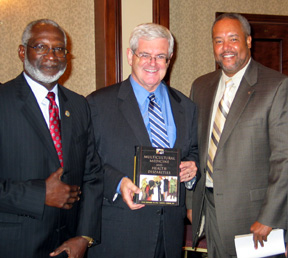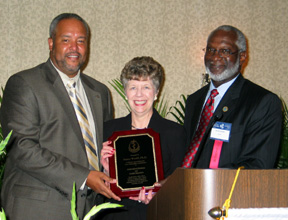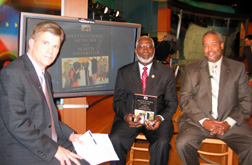 |
David Satcher, M.D., Ph.D., left, and Rubens Pamies, M.D., right, visit with former House Speaker Newt Gingrich Fifth Annual Primary Care and Prevention Conference in Atlanta. Drs. Satcher and Pamies co-authored a new book dealing with medical disparities, and Gingrich discussed some of these disparities in his panel discussion at the conference. |
The book, “Multicultural Medicine and Health Disparities,” was unveiled last week during the Fifth Annual Primary Care and Prevention Conference in Atlanta. A book signing was held at the conference.
Dr. Pamies, vice chancellor for academic affairs and dean of graduate studies at UNMC, and the book’s other co-author, David Satcher, M.D., Ph.D., interim president of Morehouse School of Medicine, did the three-minute live interview in the CNN studio on Sept. 22.
The interview aired at 2:15 p.m. (CDT) and was conducted by Chuck Roberts, a veteran reporter for CNN Headline News. Prior to joining CNN Headline News when it started in 1982, Roberts was one of the main weeknight anchors for KMTV (Ch. 3) in Omaha.
“The interview at CNN was a great way to launch this new book,” Dr. Pamies said. “We hope to do other interviews with the national media in the days and weeks to come. The medical disparities issue is very timely right now in light of what has occurred with the minority population in the Gulf area since Hurricane Katrina struck.”
The interview focused on Hurricane Katrina and how it has heightened people’s awareness of health disparities.
 |
Nancy Woelfl, Ph.D., director of the McGoogan Library of Medicine at UNMC, received a plaque from Drs. Pamies and Satcher for her work in editing their book on medical disparities. Dr. Woelfl has been working on the book for the past 14 months. |
Dr. Pamies cited four key things that can help address the health disparities issue — education, trust, accountability and research.
“We have to improve access to health care,” said Dr. Satcher, who served as U.S. Surgeon General from 1998 to 2002 and as director of the Centers for Disease Control and Prevention (CDC) from 1993 to 1998. “Remember that 52 percent of the people in the New Orleans area had no insurance and 32 percent were on Medicaid..so a lot of people didn’t have good access to health care.
“The thing that most people forget is that it doesn’t stop with health care — lifestyle, physical activity, nutrition, the environment (are other key factors). In some cities like Harlem, 25 percent of the children are now asthmatic.”
Dr. Pamies pointed out that certain health problems are especially problematic in minorities. “Asthma, diabetes and obesity – most of the issues that we are seeing – are very common in the American population but particularly in the minority population,” he said. “Those are the types of things we need to address if we’re going to make any kind of impact on disparities.”
When Roberts pointed out that only 6 percent of all physicians are African American, Latino or Native American, Dr. Pamies responded: “The manpower issue is key, but also the education is key. I don’t know of many schools..that are offering a specific course on health care disparities. That’s what we need. Education starts the ball rolling.”
 |
Chuck Roberts, CNN Headline News anchor, interviews Drs. Satcher and Pamies live on the CNN Headline News set in Atlanta. |
The book received additional attention at the Primary Care and Prevention Conference, as the former speaker of the U.S. House of Representatives, Newt Gingrich, cited medical disparities in a panel presentation dealing with Medicaid. Gingrich, who represented Georgia in Congress for 20 years, served as house speaker from 1995 to 1999.
Gingrich recently launched the Center for Health Transformation, a collaboration of public and private sector leaders dedicated to the creation of a modern health system that will saves lives while saving money. In addition, he and former Nebraska Sen. Bob Kerrey are serving as co-chairmen of the National Commission for Quality Long-term Care. The commission will make recommendations to policymakers on how to transform health care services for the elderly and disabled to maximize their independence and quality of life.
Gingrich said one idea whose time has come is the electronic medical record in which a person’s entire medical history can be captured on a computerized card. “The government is manically behind the times (in not moving forward with the electronic medical record),” he said. “A Rand Corporation study determined that the electronic medical record would cost something over the first five years (of implementation), but after that it would save $160 billion a year.”
Gingrich has consulted with UNMC’s Bob Bell on the electronic medical record. Bell is vice president for business and community development for UNeMed, UNMC’s technology transfer company.
Click here to listen to the entire CNN interview.
UNMC contributors
For her efforts in editing “Multicultural Medicine and Health Disparities,” Nancy Woelfl, Ph.D., professor and director of the McGoogan Library of Medicine at UNMC, was recognized with a plaque at the awards dinner at the Primary Care and Prevention Conference in Atlanta on Sept. 22.
The plaque was presented by Drs. Pamies and Satcher and recognized Dr. Woelfl for her work in editing the book over the past 14 months.
Several other UNMC people worked on chapters in the book. They included:
John Reinhardt, D.D.S., dean of the College of Dentistry; Steve Hinrichs, M.D., pathology & microbiology; Marsha Morien, business and finance; Brad Schaefer, M.D., Munroe-Meyer Institute; Mary McNamee, Ph.D., student equity & multicultural affairs; Lois Colburn, continuing education; Magda Peck, Sc.D., pediatrics; and Adam Kingston, a first-year student in the College of Medicine.
Media attention
In addition to the book signing and CNN interview, Dr. Pamies also made a presentation on health care disparities and multicultural medicine at the conference. This is one of several presentations Dr. Pamies has made over the past month. Other presentations included:
- The Union Pacific Black Employee Network Conference in Omaha on Aug. 27;
- The Midwest Global Health Conference in Omaha on Sept. 9;
- The Student National Medical Association meeting at UNMC on Sept. 25.
Dr. Pamies is slated to speak on health disparities at the Health Services and Resources Administration (HRSA) Title VII program in Bethesda, Md., on Sept. 29. He also has been invited to participate as an external reviewer for the Institute of Medicine’s report on how to reduce and eliminate health disparities.